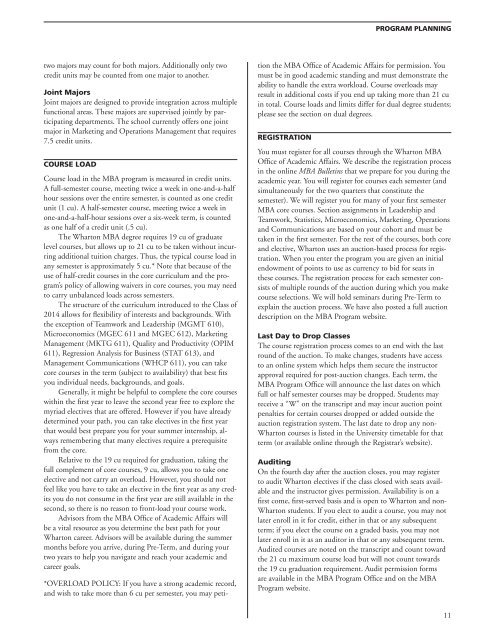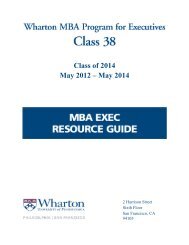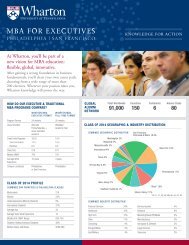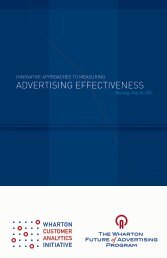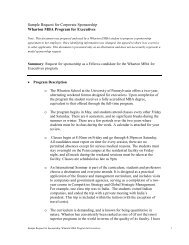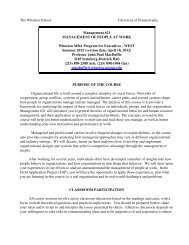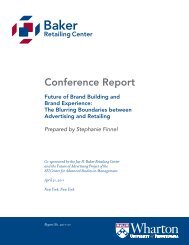Explore Options; Plan Your MBA Academic Program
Explore Options; Plan Your MBA Academic Program
Explore Options; Plan Your MBA Academic Program
Create successful ePaper yourself
Turn your PDF publications into a flip-book with our unique Google optimized e-Paper software.
two majors may count for both majors . Additionally only two<br />
credit units may be counted from one major to another .<br />
joint Majors<br />
Joint majors are designed to provide integration across multiple<br />
functional areas . These majors are supervised jointly by participating<br />
departments . The school currently offers one joint<br />
major in Marketing and Operations Management that requires<br />
7 .5 credit units .<br />
COURSE LOAD<br />
Course load in the <strong>MBA</strong> program is measured in credit units .<br />
A full-semester course, meeting twice a week in one-and-a-half<br />
hour sessions over the entire semester, is counted as one credit<br />
unit (1 cu) . A half-semester course, meeting twice a week in<br />
one-and-a-half-hour sessions over a six-week term, is counted<br />
as one half of a credit unit ( .5 cu) .<br />
The Wharton <strong>MBA</strong> degree requires 19 cu of graduate<br />
level courses, but allows up to 21 cu to be taken without incurring<br />
additional tuition charges . Thus, the typical course load in<br />
any semester is approximately 5 cu .* Note that because of the<br />
use of half-credit courses in the core curriculum and the program’s<br />
policy of allowing waivers in core courses, you may need<br />
to carry unbalanced loads across semesters .<br />
The structure of the curriculum introduced to the Class of<br />
2014 allows for flexibility of interests and backgrounds . With<br />
the exception of Teamwork and Leadership (MGMT 610),<br />
Microeconomics (MGEC 611 and MGEC 612), Marketing<br />
Management (MKTG 611), Quality and Productivity (OPIM<br />
611), Regression Analysis for Business (STAT 613), and<br />
Management Communications (WHCP 611), you can take<br />
core courses in the term (subject to availability) that best fits<br />
you individual needs, backgrounds, and goals .<br />
Generally, it might be helpful to complete the core courses<br />
within the first year to leave the second year free to explore the<br />
myriad electives that are offered. However if you have already<br />
determined your path, you can take electives in the first year<br />
that would best prepare you for your summer internship, always<br />
remembering that many electives require a prerequisite<br />
from the core .<br />
Relative to the 19 cu required for graduation, taking the<br />
full complement of core courses, 9 cu, allows you to take one<br />
elective and not carry an overload. However, you should not<br />
feel like you have to take an elective in the first year as any credits<br />
you do not consume in the first year are still available in the<br />
second, so there is no reason to front-load your course work .<br />
Advisors from the <strong>MBA</strong> Office of <strong>Academic</strong> Affairs will<br />
be a vital resource as you determine the best path for your<br />
Wharton career . Advisors will be available during the summer<br />
months before you arrive, during Pre-Term, and during your<br />
two years to help you navigate and reach your academic and<br />
career goals .<br />
*OVERLOAD POLICY: If you have a strong academic record,<br />
and wish to take more than 6 cu per semester, you may peti-<br />
tion the <strong>MBA</strong> Office of <strong>Academic</strong> Affairs for permission . You<br />
must be in good academic standing and must demonstrate the<br />
ability to handle the extra workload . Course overloads may<br />
result in additional costs if you end up taking more than 21 cu<br />
in total . Course loads and limits differ for dual degree students;<br />
please see the section on dual degrees .<br />
REGISTRATION<br />
PROGRAM PLANNING<br />
You must register for all courses through the Wharton <strong>MBA</strong><br />
Office of <strong>Academic</strong> Affairs . We describe the registration process<br />
in the online <strong>MBA</strong> Bulletins that we prepare for you during the<br />
academic year . You will register for courses each semester (and<br />
simultaneously for the two quarters that constitute the<br />
semester) . We will register you for many of your first semester<br />
<strong>MBA</strong> core courses . Section assignments in Leadership and<br />
Teamwork, Statistics, Microeconomics, Marketing, Operations<br />
and Communications are based on your cohort and must be<br />
taken in the first semester . For the rest of the courses, both core<br />
and elective, Wharton uses an auction-based process for registration<br />
. When you enter the program you are given an initial<br />
endowment of points to use as currency to bid for seats in<br />
these courses . The registration process for each semester consists<br />
of multiple rounds of the auction during which you make<br />
course selections . We will hold seminars during Pre-Term to<br />
explain the auction process . We have also posted a full auction<br />
description on the <strong>MBA</strong> <strong>Program</strong> website .<br />
Last Day to Drop Classes<br />
The course registration process comes to an end with the last<br />
round of the auction . To make changes, students have access<br />
to an online system which helps them secure the instructor<br />
approval required for post-auction changes . Each term, the<br />
<strong>MBA</strong> <strong>Program</strong> Office will announce the last dates on which<br />
full or half semester courses may be dropped . Students may<br />
receive a “W” on the transcript and may incur auction point<br />
penalties for certain courses dropped or added outside the<br />
auction registration system . The last date to drop any non-<br />
Wharton courses is listed in the University timetable for that<br />
term (or available online through the Registrar’s website) .<br />
Auditing<br />
On the fourth day after the auction closes, you may register<br />
to audit Wharton electives if the class closed with seats available<br />
and the instructor gives permission . Availability is on a<br />
first come, first-served basis and is open to Wharton and non-<br />
Wharton students . If you elect to audit a course, you may not<br />
later enroll in it for credit, either in that or any subsequent<br />
term; if you elect the course on a graded basis, you may not<br />
later enroll in it as an auditor in that or any subsequent term .<br />
Audited courses are noted on the transcript and count toward<br />
the 21 cu maximum course load but will not count towards<br />
the 19 cu graduation requirement . Audit permission forms<br />
are available in the <strong>MBA</strong> <strong>Program</strong> Office and on the <strong>MBA</strong><br />
<strong>Program</strong> website .<br />
11


